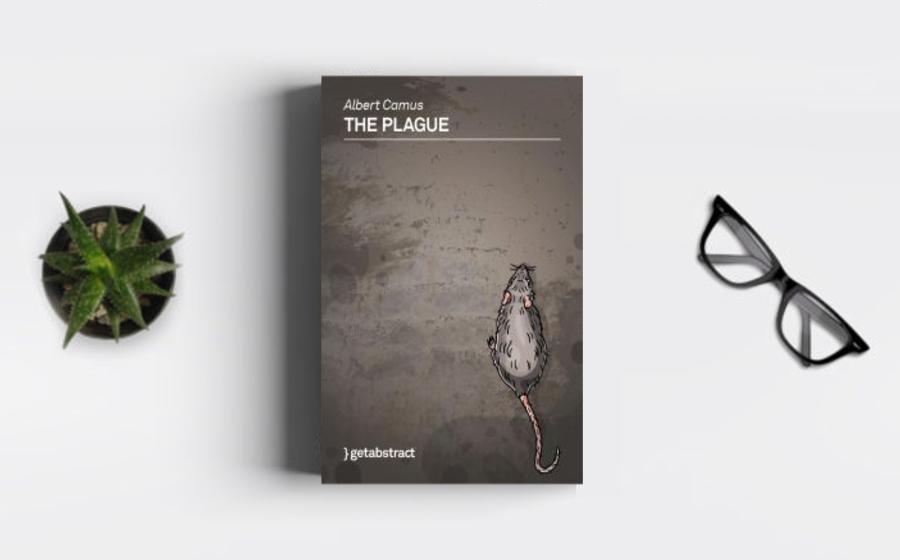"The Plague," published in 1947, stands as a literary
masterpiece that transcends its immediate post-World War
II context, offering timeless reflections on life,
morality, and the human condition. Set in the fictional
Algerian town of Oran, the novel unfolds as a chronicle
of an outbreak of bubonic plague and becomes a profound
exploration of existentialism, morality, and the quest
for meaning in the face of the absurd. Through the
experiences of the diverse inhabitants of Oran, Camus
crafts an allegory that prompts readers to contemplate
the complexities of existence and the human response to
suffering and meaninglessness.
The narrative
begins with the sudden appearance of rats dying in the
streets, marking the prelude to the town's descent into
a plague. As the contagion spreads, the town is sealed
off, and its inhabitants must confront the harsh
realities of an epidemic that disrupts the normal course
of life. The plague, in Camus' hands, becomes a metaphor
for the absurdity and unpredictability of human
existence, prompting readers to reflect on the
inevitability of suffering and the existential
challenges inherent in life.
The central
character, Dr. Bernard Rieux, emerges as a narrator and
participant in the unfolding tragedy. As a physician,
Rieux is at the forefront of the battle against the
plague, and his observations become a lens through which
Camus explores the human response to crisis. Rieux's
commitment to fighting the plague, despite acknowledging
the futility of the endeavor, becomes a reflection on
the inherent responsibility individuals have toward one
another in the face of suffering.
Camus'
existential philosophy permeates the novel, with the
plague serving as a metaphor for the human condition.
The absurdity of life, a central tenet of
existentialism, is mirrored in the randomness and
unpredictability of the plague's onset. Camus challenges
readers to confront the absurdity of a world where
suffering exists without apparent reason, where
individuals must grapple with the arbitrariness of fate
and the absence of inherent meaning in their struggles.
The diverse cast of characters in Oran provides a
multifaceted exploration of human responses to the
absurdity of the plague. From the indifferent bureaucrat
to the reckless journalist, each character embodies
different facets of the human psyche when confronted
with existential challenges. Through their experiences,
Camus invites readers to reflect on the ways in which
individuals cope with uncertainty, grapple with the loss
of meaning, and strive to find purpose in the midst of
chaos.
The figure of Father Paneloux, a Jesuit
priest in Oran, introduces the theme of religious
existentialism. Initially preaching a fiery sermon
attributing the plague to divine punishment, Paneloux
undergoes a transformation when confronted with the
suffering it brings. His later sermon, acknowledging the
mystery of human suffering, becomes a powerful
reflection on the limitations of religious certainty in
the face of existential questions. Camus challenges
readers to consider the complexity of faith and the
human tendency to seek religious explanations for the
inexplicable, while also acknowledging the limitations
of such explanations in the face of profound suffering.
The symbolism of the plague's rats and the swarms of
dying animals adds another layer to the novel's
reflections on life. The rats, initially heralding the
outbreak, become a potent symbol of the unseen forces
that shape human destinies. The image of the dying
animals serves as a visceral reminder of the inherent
brutality of nature and the relentless cycle of life and
death. Camus prompts readers to confront the harsh
realities of existence, asking them to reflect on the
natural order that governs life and the fragility of
human endeavors in the face of cosmic indifference.
Camus' exploration of love and human connection
becomes a central theme in "The Plague." The
relationships that form during the crisis, such as the
camaraderie among the volunteers and Rieux's deep
connection with his ailing wife, illustrate the
redemptive power of human bonds. In the face of the
absurdity of the plague, these connections become a
source of meaning and purpose, emphasizing the profound
impact of human relationships in the quest for
existential meaning.
The novel's narrative
structure, framed as Rieux's chronicle, contributes to
the sense of reflection on life's complexities. Rieux,
looking back on the events, becomes both an observer and
a participant in the drama, allowing readers to engage
with the unfolding story through the lens of
retrospective contemplation. This narrative choice
creates a space for readers to reflect on the broader
implications of the plague, transcending its immediate
context to consider its allegorical resonance with the
human experience.
Camus' exploration of the
concept of exile adds a nuanced layer to the novel's
reflections on life. The town's isolation, imposed by
the plague, becomes a metaphor for the existential exile
individuals experience in a world bereft of inherent
meaning. The physical and metaphysical separation from
the familiar prompts readers to contemplate the nature
of existential loneliness and the human quest for
connection and understanding in a seemingly indifferent
universe.
The novel's denouement, with the
eventual subsiding of the plague, becomes a reflection
on the cyclical nature of existence. While the immediate
crisis recedes, the scars of the plague linger, serving
as a reminder of the enduring impact of suffering. Camus
challenges readers to confront the transitory nature of
relief and the ongoing struggle for meaning in the
aftermath of existential crises.
"The Plague" by Albert Camus is a profound exploration of life, existentialism, and the human response to suffering. Through the allegory of a fictional epidemic, Camus crafts a narrative that transcends its temporal and geographical setting to offer timeless reflections on the absurdity of existence. The novel prompts readers to confront the unpredictability of life.






